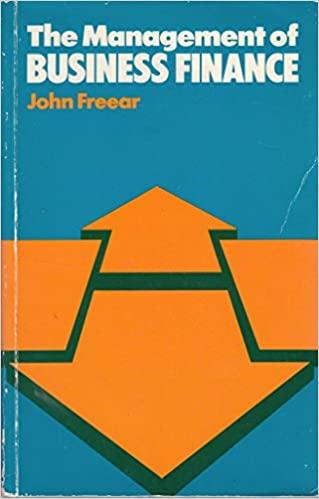Question
Question 2 1.1)We want to examine the difference in sprint speed between two methods of training (A and B) for short-distance runners. The runners have
Question 2
1.1)We want to examine the difference in sprint speed between two methods of training (A and B) for short-distance runners. The runners have been randomly allocated to one of the two methods and have trained for the last 5 weeks using the respective method. We make 10 individuals of each method run down a race track and measure the time they take. We have two race tracks. Which of the following would be the best experimental design?
a)Discard one track and let the runners race on the same track after randomising the order in which individuals are being tested. b)Pair up each runner from method A with a runner from method B, so that they are similar in height, age, and weight and let them race at the same time. For each pair, randomly allocate the two runners to the two tracks. c)Let runners from method A use the first track and runners from method B the second track. d)Randomly assign the tracks to method A and method B so that all runners with the same method use the same track to minimize the variability within treatment.
1.2)Consider a simple experiment with three treatments (A, B and C), where the treatments were randomly assigned to the experimental units. Then you conduct the experiment in the following order: A, A, A, B, B, B, C, C, C. Which of the following problems might this experiment suffer from?
a)no replication b) pseudo-replication c)treatments confounded with experimental units d) treatments confounded with time e) no blocking
1.3)What design should be used for the following situation? I want to investigate whether sleep deprivation has the same effect in beginning drivers, medium experienced and experienced drivers. The experiment will be conducted with a driving-simulator.
a)factorial design b)completely randomized design c)randomized block design d)Latin square design e) nested design
1.4)A researcher wants to study the effect of 4 different treatments on the growth of bacteria. The treatments include a control as well as three combinations of growth inhibitors and enhancers. Each treatment was assigned to a randomly selected petri dish containing cells harvested from one of four similar bacteria cultures. 10 seven-day old cells were harvested from each dish and measured. The treatments were then applied and after 3 days, 10 additional ten-day old cells were harvested from each petri dish and the cells were measured. A measure of relative growth was recorded for each dish. Match the following
- A. experimental unit i)petri dish
- B. treatment ii)individual bacteria cell
- C. observational unit iii)level of growth enhancer/inhibitor
- D. None of the Above iiii)bacteria culture
1.5)Student A. designs an experiment to see how the thickness of paper used to make a paper airplane affects the distance it will travel. She makes four airplanes that are the same shape but of different thickness. She has the same person throw the airplanes inside the sports centre with the same amount of force. Then she measures how far each airplane has travelled. Which of the following is the experimental unit?
a)distance travelled b)amount of force used to throw the airplane c)thickness of paper d)person throwing the plane e)airplane
Step by Step Solution
There are 3 Steps involved in it
Step: 1

Get Instant Access to Expert-Tailored Solutions
See step-by-step solutions with expert insights and AI powered tools for academic success
Step: 2

Step: 3

Ace Your Homework with AI
Get the answers you need in no time with our AI-driven, step-by-step assistance
Get Started


